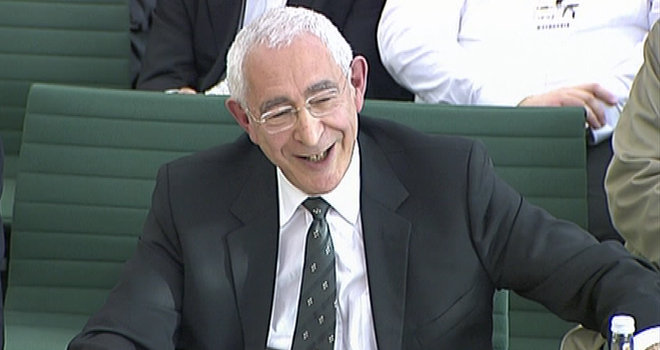By David Gold at Westminster in London
May 10 – Lord Triesman told the Parliamentary inquiry into England’s failed bid to win the right to host the 2018 World Cup today that four FIFA Executive Committee members – Jack Warner, Nicolas Leoz, Ricardo Teixeira and Worawi Makudi – asked for bribes during the bidding process.
Warner allegedly asked for money for sports facilities and for purchasing the TV rights to the 2010 World Cup for Haiti, which was hit by an earthquake in January 2010.
“Jack Warner was very concerned that after all his years he had nothing to consider his legacy,” Triesman told the Committee.
“He proposed some school or academy should be built and a set of offices that would be his legacy to Trinidad and Tobago.
“[Premier League chairman Sir] Dave [Richards] said, ‘You must be joking, that must be about £2.5 million ($4.1 million),’ and Warner nodded.
“He said the money could be channelled through him and he would ensure that it was appropriately spent.”
Triesman alleged that Leoz asked for a knighthood.
“Mr Leoz said that he believed an appropriate way of recognising his role in football was not through money, but through an honour,” said Triesman.
“He thought a knighthood would be appropriate, and I told him that was completely impossible.”
Triesman then recalled a bizarre conversation he had with Teixeira in Qatar, when the Brazilian football chief had simply asked me to ‘tell him what I had for him.'”
The fourth allegation that the former FA chief detailed pertained to the Thai Executive Committee member Makudi.
According to Triesman, Makudi wanted England to play a game with Thailand, and insisted that the money from the television rights for that game should go directly to him.
Triesman said that “he believed that was critical to making the arrangement a success”.
The former bid leader admitted that he had not told FIFA about these incidents during the campaign because he believed it would have damaged England’s bid further still.
When probed by the Select Committee, Triesman indicated that he believed that the Executive Committee members must have been aware that what they were asking of him was essentially to bribe them.
“They all took place in the context of formal approaches,” he said.
“In my view did not represent proper and ethical behaviour on the part of members of the Executive Committee.
“It is hard to think that a FIFA Executive Committee member would be unaware that these things would be linked.
“I thought from the moment that Seb Coe stepped back from his role with the FIFA Ethics Committee that there was a vacuum.”
Triesman confirmed that he would be going forward to present his evidence to FIFA, and urged world football’s governing body to take the issue seriously, though he feared they would close ranks.
“It should be a pressing concern,” he said.
“We have a number of credible pieces of investigative journalism.
“The first response will probably be that it never happened, but it is crucial to clear up anything that is dubious.”
Contact the writer of this story at zib.l1745040446labto1745040446ofdlr1745040446owedi1745040446sni@d1745040446log.d1745040446ivad1745040446

